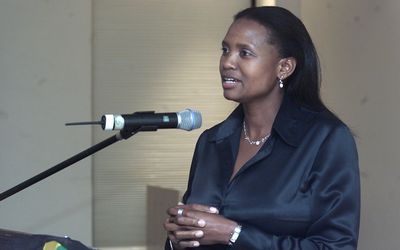THE tragic death of Hope Zinde, found in the boot of her car at her own home, is in many ways an indictment of a society that has ignored a problem faced by families across the country. Author, writer and political commentator Malaika Mahlatsi reminded her Facebook audience of Ellen Pakkies, a mother from the Western Cape who strangled her drug addict son after years of trauma. She immediately handed herself over to the police. As Malaika so eloquently writes, "the murder of the phenomenal aunt Hope Zinde, allegedly at the hands of her drug-addict son, must remind us that for as long as we don’t treat the drug crisis in our country with the urgency that it demands, we are going to bury more mothers — or turn more mothers into killers".
According to some, there is a link between quality of life and substance abuse, and although by no means a "poor people" problem, low-income communities endure the brunt of the issues because they do not have the means to support addicted family members. Better off families have the means to suffer in silence, hoping tragedy does not strike. In the end, substance abuse becomes a shared problem about which we know little and about which we do not speak much.
Reliable substance abuse statistics for SA are often hard to obtain, yet the issue is having a serious impact on the quality of life of young South Africans, their families and communities. Without information, people fill in the gaps and resort to their own community-based interventions, which often criminalise addicts, to deal with immediate issues, rather than approach the issue more systemically.
The Department of Social Development’s revised National Drug Master Plan 2013-2017 does advocate for a community-up approach instead of one-size-fits-all approaches. However, communities and families are still too often being left to deal with the issue on their own.
In my other life, I manage a youth-voter campaign, #2X. As part of this campaign, we have hosted several engagements with young people across different provinces from rural to urban spaces. Of course, young people face different challenges, influenced by their geographic and social placement in our society, but substance abuse is always one of the top-three issues they mention, even though in some places (Kimberley, for example) it is more concerning than others.
Whether it is in these engagements or the many wall murals we have placed across the country, we find over and over again that these three words — unemployment, crime, drug abuse (especially nyaope) — seem to travel together in a pack.
According to the revised drug master plan, strategies to combat substance abuse have often been implemented with inadequate monitoring and evaluation of the effect of programmes.
Little is known about the effect of warning labels on liquor bottles, for example, and popular mass media campaigns are ineffective.
Even less is known about what does and does not work to get the lives of young addicts back on track. We do not know what to do and we are not investing enough to find out.
On Thursday, we will commemorate the 40th anniversary of the June 16 student uprising. We will stand on podiums and remind young people how past generations of youths like themselves mobilised peacefully to confront a brutal and repressive state.
Drunk from disingenuous nostalgia, we will deflect attention away from conversations of young people’s current experiences. We will not ask what it is like to live without hope. Families and communities will not ask what it is like to live with the young and hopeless. We will not ask if there can be agency without hope. We will not ask ourselves how, 40 years later, it is still so damn hard to be a young South African.
• Ndlovu is the deputy MD of Livity Africa and a Bertha Scholar

Hope Zinde. Picture: PETER MOGAKI
THE tragic death of Hope Zinde, found in the boot of her car at her own home, is in many ways an indictment of a society that has ignored a problem faced by families across the country. Author, writer and political commentator Malaika Mahlatsi reminded her Facebook audience of Ellen Pakkies, a mother from the Western Cape who strangled her drug addict son after years of trauma. She immediately handed herself over to the police. As Malaika so eloquently writes, "the murder of the phenomenal aunt Hope Zinde, allegedly at the hands of her drug-addict son, must remind us that for as long as we don’t treat the drug crisis in our country with the urgency that it demands, we are going to bury more mothers — or turn more mothers into killers".
According to some, there is a link between quality of life and substance abuse, and although by no means a "poor people" problem, low-income communities endure the brunt of the issues because they do not have the means to support addicted family members. Better off families have the means to suffer in silence, hoping tragedy does not strike. In the end, substance abuse becomes a shared problem about which we know little and about which we do not speak much.
Reliable substance abuse statistics for SA are often hard to obtain, yet the issue is having a serious impact on the quality of life of young South Africans, their families and communities. Without information, people fill in the gaps and resort to their own community-based interventions, which often criminalise addicts, to deal with immediate issues, rather than approach the issue more systemically.
The Department of Social Development’s revised National Drug Master Plan 2013-2017 does advocate for a community-up approach instead of one-size-fits-all approaches. However, communities and families are still too often being left to deal with the issue on their own.
In my other life, I manage a youth-voter campaign, #2X. As part of this campaign, we have hosted several engagements with young people across different provinces from rural to urban spaces. Of course, young people face different challenges, influenced by their geographic and social placement in our society, but substance abuse is always one of the top-three issues they mention, even though in some places (Kimberley, for example) it is more concerning than others.
Whether it is in these engagements or the many wall murals we have placed across the country, we find over and over again that these three words — unemployment, crime, drug abuse (especially nyaope) — seem to travel together in a pack.
According to the revised drug master plan, strategies to combat substance abuse have often been implemented with inadequate monitoring and evaluation of the effect of programmes.
Little is known about the effect of warning labels on liquor bottles, for example, and popular mass media campaigns are ineffective.
Even less is known about what does and does not work to get the lives of young addicts back on track. We do not know what to do and we are not investing enough to find out.
On Thursday, we will commemorate the 40th anniversary of the June 16 student uprising. We will stand on podiums and remind young people how past generations of youths like themselves mobilised peacefully to confront a brutal and repressive state.
Drunk from disingenuous nostalgia, we will deflect attention away from conversations of young people’s current experiences. We will not ask what it is like to live without hope. Families and communities will not ask what it is like to live with the young and hopeless. We will not ask if there can be agency without hope. We will not ask ourselves how, 40 years later, it is still so damn hard to be a young South African.
• Ndlovu is the deputy MD of Livity Africa and a Bertha Scholar



















